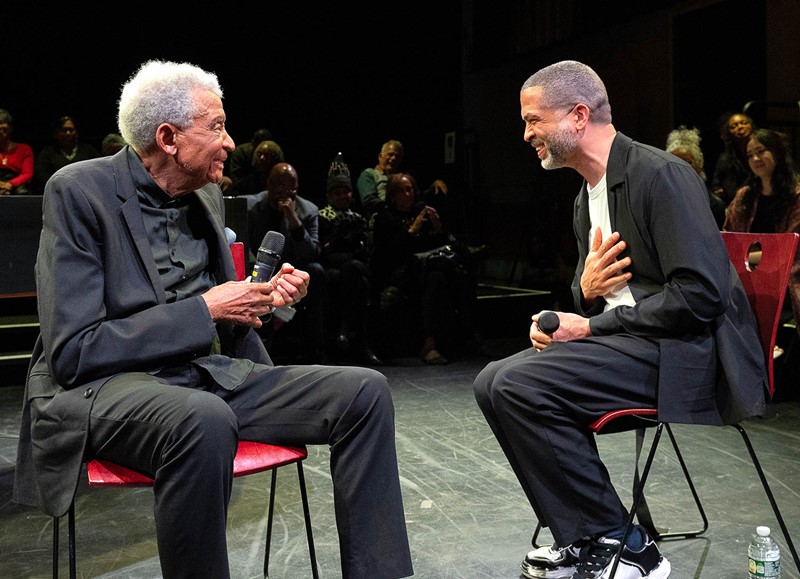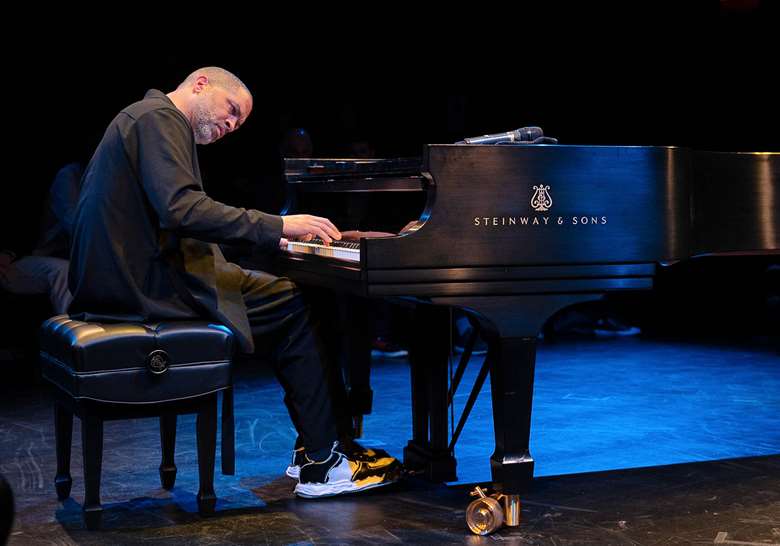There could be no more appropriate spot for a celebration of Duke Ellington’s 29 April quasquicentennial (125th anniversary) than City College of New York’s Harlem Stage Gatehouse, a gorgeous performing arts center inhabiting a former pumping station.
You actually have to take the A train to get there (you could then transfer to the C but miss a stroll through the picturesque and historic neighborhood). About 20 blocks north is where Ellington himself lived from 1939-61. A 20-minute walk northeastward brings one to the former site of the Cotton Club, homebase for Ellington bands in the ‘20s-30s, while the same distance southeastward is the famed Apollo Theatre, where Ellington appeared over a hundred times during the ‘30s-60s. And just a stone’s throw from the venue is where City College’s Lewisohn Stadium once stood, Ellington performing there in 1951 (premiering the symphonic piece “Harlem” with his band and the NBC Symphony Orchestra), 1958 and 1965. Adding to the perfection, the same weekend as “Pianos for Duke Reimagined” was taking place at Harlem Stage Gatehouse, the nearby Schomburg Center for Research in Black Culture hosted the 12th Annual Black Comic Book Festival. Duke Ellington may be the closest thing jazz has to a real-life superhero.

The pianists for the first evening, 26 April, were a multi-generational cast, demonstrating the breadth of Ellington’s influence. South African Abdullah Ibrahim owes much of his career to Ellington, who facilitated his first international release in 1963. Bertha Hope (along with her long-departed fellow pianist husband Elmo) was of the early generations influenced by Ellington’s innovations. Joanne Brackeen has covered Ellington’s compositions on her albums as well as being part of the 1999 Arkadia Jazz All-Stars Ellington tribute album. And while Jason Moran, the program’s Artistic Director and a musician keenly aware of history, and Micah Thomas (with Matthew Whitaker in his place on the second night) were born after Ellington’s passing, they are both flowering branches of his deeply-rooted tree.
The program, “Pianos for Duke Reimagined”, part of Harlem Stage’s 40th season, was also a 25th anniversary celebration of series of concerts held at City College’s Aaron Davis Hall in December 1999, curated by soon-to-be-retiring Harlem Stage Artistic Director Patricia Cruz. Those shows featured Muhal Richard Abrams, Geri Allen, Andrew Hill, John Hicks, Randy Weston—all sadly departed—and Jason Moran, then just shy of 25.
It should be noted that the first night started about 30 minutes late due to the venue’s lighting failing for the first time in its history (“Harlem Nocturne”, anyone?). What was at first was an aggravating wait became a magical experience as the piano was set up on the floor, seats surrounding it, and illuminated by a single spotlight, making an intimate gathering feel like each musician was playing just for an audience of one.
Though there was a common wellspring, each pianist approached Ellington in a unique way, making the most of short recitals, ranging from Thomas at 17 minutes to Hope the longest at 30.
As a nice bookend, opener Thomas and closer Ibrahim played continuously, the former abstractly exploring Ellington themes while the latter scattered crumbs of them within a medley of his own pieces. Moran, Hope and Brackeen each played discrete tunes: Moran somehow both the most traditional and furthest-reaching, Hope especially deliberate in her adornments and Brackeen sounding the most reverent.
Thomas exemplified Ellington’s tone poem approach, gentle beginnings evoking Harlem waking up with the sunrise, continuing more densely as the denizens began their day’s work, dodging traffic and generating a buzz of overlapping conversations, then returning to quiet as the light dimmed and people returned to their brownstones for slumber.
The highlight of Moran’s portion was a ten-minute reading of “Black and Tan Fantasy”, barroom meeting concert hall, rollicking and virtuosic. Towards the end, he kept up a manic flurry at the keyboard’s low end, rumbling and gyrating with ever-increasing tension until suddenly dropping back into the theme, the audience exhaling simultaneously with the release.
Hope embodied “Sophisticated Lady”, her approach full of elegance and restraint. It was fascinating to hear her play songs she grew up with musically, including the first Ellington piece she learned, “I Like The Sunrise”, imbuing them with new reflection and meaning.
Brackeen played her selection the most straightahead, bringing the audience in even closer with a smoky jazz club vibe. “Caravan” featured her most fervent embellishments, abstracting the famous rhythms to wonderful effect.
Witnessing an Ibrahim solo recital is like watching someone type out their life story, letter by letter, the musical equivalent of the knots in an Andean quipu, every note plumbing astonishing depths. He has mastered the idea of infinity from simplicity. No matter how many times one sees it, it feels like the first time, the aching blues throughout always transformative. After his last note rung out, Ibrahim stood and began to intone a melding of the title libretto from Ellington’s groundbreaking 1941 review Jump For Joy and his own “Trance-Mission – The Sound Of Centuries Old Maritime Cargo…”, his voice plaintive and fragile as spoke of slavery and oppression both in the distant past and in his own lifetime.
Original article written by Andrey Henkin on Jazzwise
